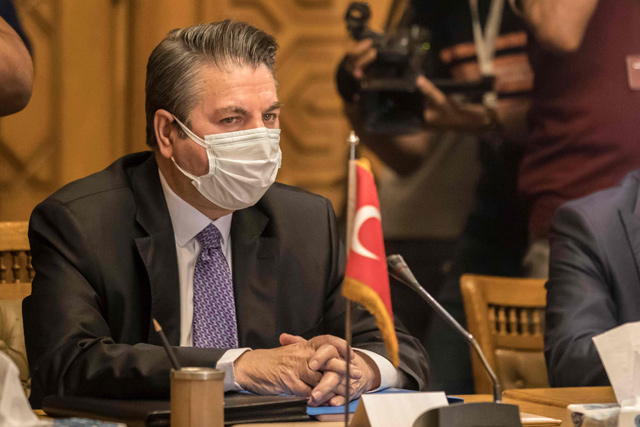CAIRO — Turkey and Egypt have begun slowly warming ties as they vie for regional primacy a decade after the Arab Spring, but analysts say deep-seated mistrust means full normalisation will take time.
A Turkish delegation headed by Deputy Foreign Minister Sedat Onal met on Wednesday with an Egyptian delegation led by his counterpart Hamdi Loza, AFP reporters said.
The two-day talks come nearly two months after Ankara established the first diplomatic contacts with Cairo since 2013, as part of wider efforts to mend fences with Middle Eastern rivals.
Ankara and Cairo have both faced more US pressure since the departure of president Donald Trump, and both have been extending olive branches to their neighbours.
Egyptian President Abdel Fattah Al Sisi and his Turkish counterpart Recep Tayyip Erdogan have been sparring since the military's 2013 ouster in Cairo of Islamist president Mohamed Morsi, personally backed by Erdogan.
Egypt's restoration of ties with Qatar in January, after a four-year Gulf blockade along with the UAE, Saudi Arabia and Bahrain, has also boosted efforts towards more regional diplomacy.
"What has become apparent to Egypt... is that it's difficult for any regional power to win through a knockout punch, but rather through points," Abdul Khaleq Abdallah, a political science professor in the UAE, told AFP.
"Meeting halfway is enough in this instance... but the situation is fluid, so it could flare up again," he added.
Cairo has not appeared to share the same level of enthusiasm for rapprochement as Turkey; Egypt's Foreign Minister Sameh Shoukry noted in March that "words are not enough, they must be matched by deeds".
“There’s a great deal of mistrust fuelled by eight years of open hostility, and so Egypt feels hesitant,” said Nael Shama, the author of a book on Egypt’s foreign policy under deposed leaders Morsi and Hosni Mubarak.
After the 2011 Arab Spring uprisings in several Middle Eastern countries, Istanbul became a refuge for Islamist opposition activists, especially for Egyptians linked to Morsi’s outlawed Muslim Brotherhood.
In March, Erdogan’s advisers demanded popular Egyptian exiled talk show hosts, such as Moataz Matar and Mohamed Nasser, tone down their criticism of Egypt’s leader.
Previously convicted in absentia to 10 years in prison each and placed on Egypt’s terrorism list for “attempting to overthrow the regime”, the flamboyant anchors were forced to shut down their programmes, giving their audiences emotional farewells.
They are still regularly described as “traitors” and “terrorists” by pro-Sisi media.
Among Sisi’s supporters, their sidelining was seen as a crucial ideological victory.
“Turkey asking the Egyptian opposition to stop its [media] campaign against the Egyptian government is quite significant for Egypt,” said Ibrahim Awad, a public policy professor at the American University in Cairo (AUC).
But he expressed doubt that Matar and Nasser would be extradited.
At massive rallies in past years, Erdogan has frequently raised a four-finger salute seen as a tribute to hundreds of Muslim Brotherhood supporters killed by security forces in Cairo following Morsi’s ouster.
The Turkish president has won the devotion of his Islamist base as a champion of regional grievances since the Arab Spring.
But Awad noted that if normalisation continues smoothly, in the long run it “reinforces the position of Egypt... in the Middle East”.
Amr Adib, a popular late-night talk show host who regularly interviews Sisi live on air, struck a cautious tone about the Turkish delegation’s visit.
“See how things have changed so much... I mean if we manage to get an understanding during the talks then that’s all well and good, and if not then that’s fine too,” he said on Monday.
In oil-rich Libya, which descended into chaos in the aftermath of the 2011 NATO-backed uprising that ousted dictator Muammar Qadhafi, Turkey and Egypt, backed by the UAE, have been on opposite sides of the conflict.
“Everyone will benefit from defusing the acute tensions in the region, including disengagement from hotspots, chiefly Libya,” said Abdallah, the Emirates-based professor.
“The UAE isn’t just a backer of Egypt, it has been encouraging of cooling down any flare ups,” he added.
Since the selection this year of a new interim Libyan prime minister in a UN-sponsored process, Cairo and Ankara have appeared more open to a political solution to that conflict.
Ankara working with Cairo to resolve the Libyan conflict could have “a knock-on effect” of improving Turkey’s ties with Saudi Arabia, Israel, the UAE and Greece, said Bashir Abdel-Fattah.
The researcher at Egypt’s state-affiliated Al Ahram Centre for Political and Strategic Studies voiced optimism for reconciliation despite years of tensions.
“It’s very easy in politics, that one day you can attack a country and the next day you sit down and hammer out your differences,” he said.
“This is what’s happening now.”
